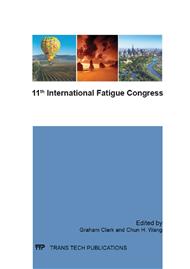p.248
p.254
p.261
p.267
p.273
p.278
p.289
p.295
p.301
Three Ways of Sampling and Fatigue Test Results of Steel P92
Abstract:
This paper describes the fatigue properties of the steel P92. This material is widely used in the energy industry, especially for pipes and pipe bends of supercritical steam turbines. Steel P92 is alloyed with 2 % of tungsten compared to steel P91. This increases a creep strenght of the material. It is possible to reduce wall thickness of the P92 pipe up to about 20%. Fatigue tests were carried out on standard samples and compared with SFT samples (Small Fatigue Test). Using the device SSam 2 made by company Rolce Royce, it is possible to gently remove a samples from energy component without power plant shutdowns. Consider these correlations, i tis possible to determine mechanical properties of the material from small amount of removed experimental material.
Info:
Periodical:
Pages:
273-277
Citation:
Online since:
March 2014
Authors:
Keywords:
Price:
Сopyright:
© 2014 Trans Tech Publications Ltd. All Rights Reserved
Share:
Citation:


